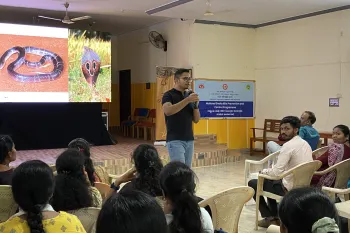MYSORE, Karnataka, India—The District Surveillance Unit, District Health and Family Welfare office, Mysure district, along with Humane World for Animals India (formerly called Humane Society International India) and The Liana Trust, have successfully trained 100% of the district’s Community Health Officers CHO working in Ayushman Arogya Mandirs AAM as first responders to snakebite, including preparedness and first aid.
This training marks a significant milestone in addressing one of the most neglected public health concerns in Karnataka. There are an estimated 58,000 human deaths from venomous snakebite in India every year, and up to a further 200,000 cases of life-debilitating morbidity. In addition to the human toll, snake persecution is a real conservation and welfare issue that sees many thousands of snakes needlessly killed or relocated every year. By equipping CHOs with the right knowledge, this workshop not only saves human lives but also helps reduce fear-driven killing of snakes.
Over the course of five day-long trainings, 280 CHOs from all seven taluks learned more about a wide range of topics including identifying commonly seen venomous snakes, recognizing likely snakebite scenarios and prevention strategies, the essential dos and don’ts in cases of a bite, the importance of promoting coexistence with snakes in rural settings, and the socio-economic and psychological impact of snakebites on individuals and families.
CHOs serve as a vital link between rural communities and the healthcare system, thereby playing a crucial role in educating the residents of vulnerable farming communities and cattle rearers on behaviour changes that can foster coexistence and help avoid snakebites, proper first aid practices in the event of a bite, and clarify various myths concerning snakebite that can complicate good responses to bite cases.
District Surveillance Officer, Dr Nagaraj DG said: “CHOs being the important link between rural communities and the public health are of course the first line responders to address the health concerns of the community. This training I believe is very important, especially creating awareness among the public regarding snakebites and thereby reducing the mortality and morbidity significantly and also avoid snake persecution and thus ensuring ecological balance.”
Gerry Martin, founder and trustee of The Liana Trust added: “While research continues at a steady pace on developing the next generation of therapies and improving existing ones, the role of community education in preventing bites and deaths is equally, if not more important. Human behavioural change needs reinforcement of the right messaging from reliable sources. CHOs are a hence a great vehicle for change.”
Speaking about the programs, Sumanth Bindumadhav, director, wildlife protection at Humane World for Animals India, said: “Snakebites can be prevented, human lives can be saved and snake persecution can be avoided if community members have the right information. CHOs are an institutional outreach infrastructure who can be powerful forces of good with the right information and knowledge. We are extremely grateful to the DSO Mysore for taking this proactive step.”
“Promoting human-wildlife coexistence through education is a key step in ensuring the welfare of both people and snakes,” he adds.
